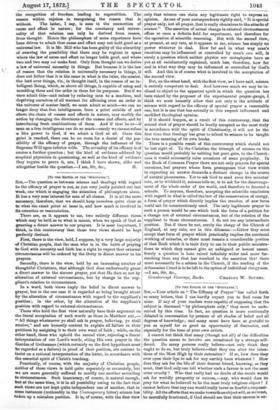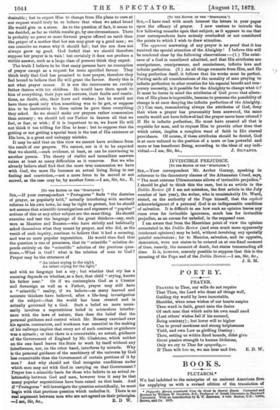[TO TRH EDITOR OF TRH "SPEaTter0a."3
SIR,—Your article on "The Efficacy of Prayer" has called forth so many letters, that I can hardly expect you to find room for mine. If any of your readers were capable of supposing that the subject is discussed "by philosophers only," they must be =de- ceived by this time. In fact, no question is more continually debated in conversation by persons of all shades of belief and all degrees of knowledge ; and many must have been as grateful to you as myself for so good an opportunity of discussion, and especially for the tone of your own article.
I cannot but think that many (though not all) of the difficulties the question seems to involve are occasioned by a strange self- deceit. Do many persons really believe—not only think they ought to do so, but truly believe—that they can alter the inten- tions of the Most High by their entreaties ? If so, how dare they ever open their lips to ask for any earthly boon whatever ? How dare they ask for the life of their dearest friend, knowing, as they must, that God only can tell whether such a favour is not the most utter cruelty ? Who that really had no doubt of the result would ask for worldly prosperity or success,—nay, who would dare to pray for what he believed to be the most truly religious object ? I cannot believe that any one would really incur so fearful a responsi- bility. All the efforts that we make towards an object will, as we trust, be mercifully frustrated, if God should see that their success-is
desirable ; but to expect to change from His plans to ours at
our request would truly be to believe that when we asked bread He would give us a stone. As to the question of fact, it seems to me decided, as far as visible results go, by one circumstance. There is probably no purer or more fervent prayer offered on earth than the prayer of a mother that her son may grow up a good man ; we can conceive no reason why it should fail ; but the son does not always grow up good. God forbid that we should therefore suppose her prayer is in vain ! but certainly it does not produce a visible answer, such as a large class of persons think they expect.
The truth 1 believe to be that many persons have no conception of prayer except as a request for some specified favour. They think truly that God has promised to hear prayer, therefore they feel bound to believe that He will grant the favour. Surely this is not what prayer means. It is not the intercourse an earthly father dukes with his children. He would have them speak to him of everything, their joys and sorrows, their faults and resolu- tions, no doubt, also, their fears and wishes ; but he would not have them speak only when something was to be got, or suppose him to be inattentive to them unless he gave them everything they asked. So we should make our prayers rather communion than entreaty ; we should tell our Father in heaven all that we feel, or fear, or wish ; if it is important to us, we know He will not think it too trifling for Him to hear ; but to suppose that the getting or not getting a special boon is the test of His existence or His love, is a great and unhappy mistake.
It may be said that on this view we cannot have evidence from the result of our prayers. We cannot, nor is it to be expected that we should,--such evidence, at least, as can be convincing to another person. The theory of visible and immediate answers raises at least as many difficulties as it removes. But we who already believe shall find that the more true communion we have with God, the more He becomes an actual living Being to our feeling and conviction,—not a mere force to be moved or not moved, as the case may be, by another force.—I am, Sir, &c., E.



































 Previous page
Previous page